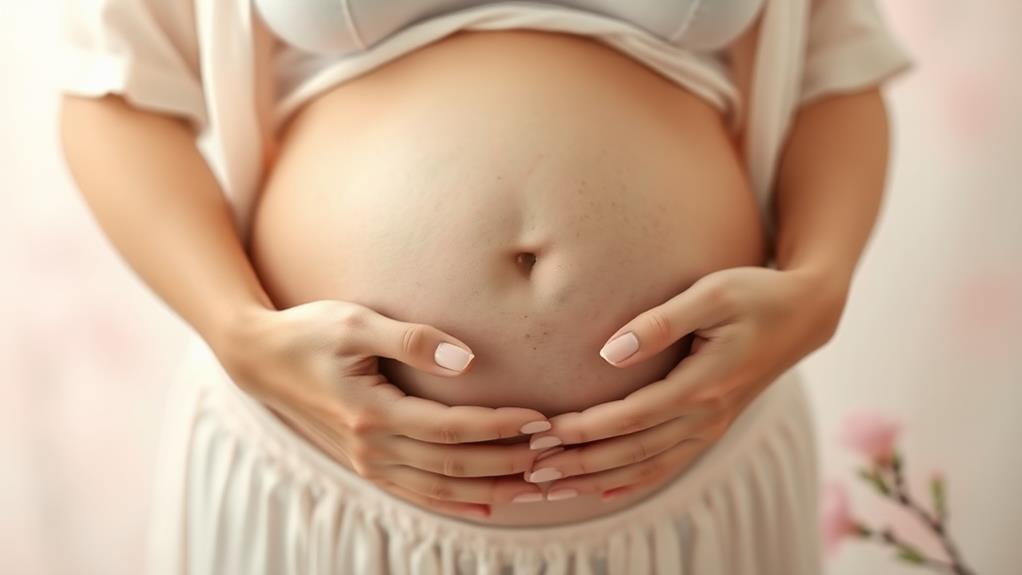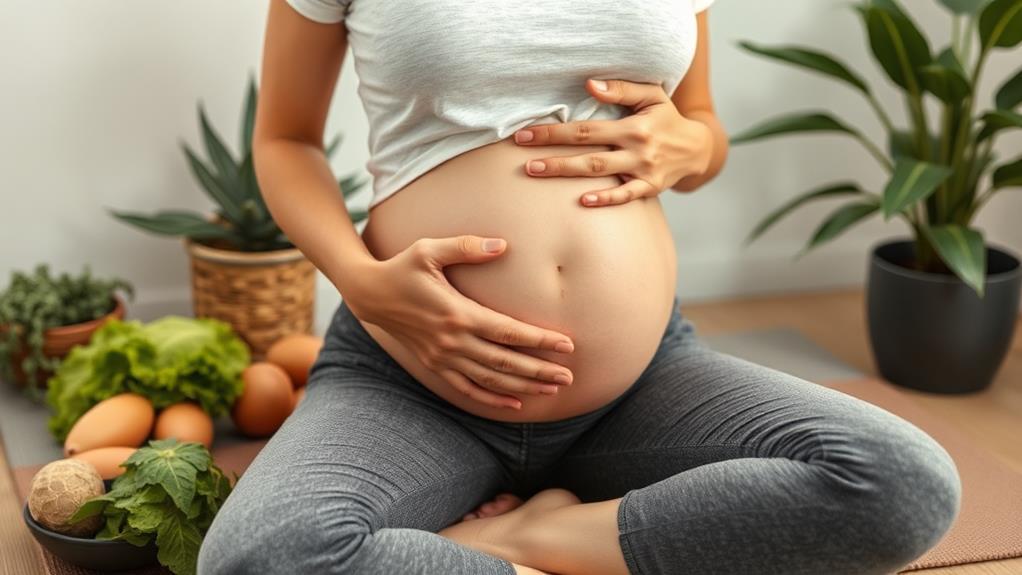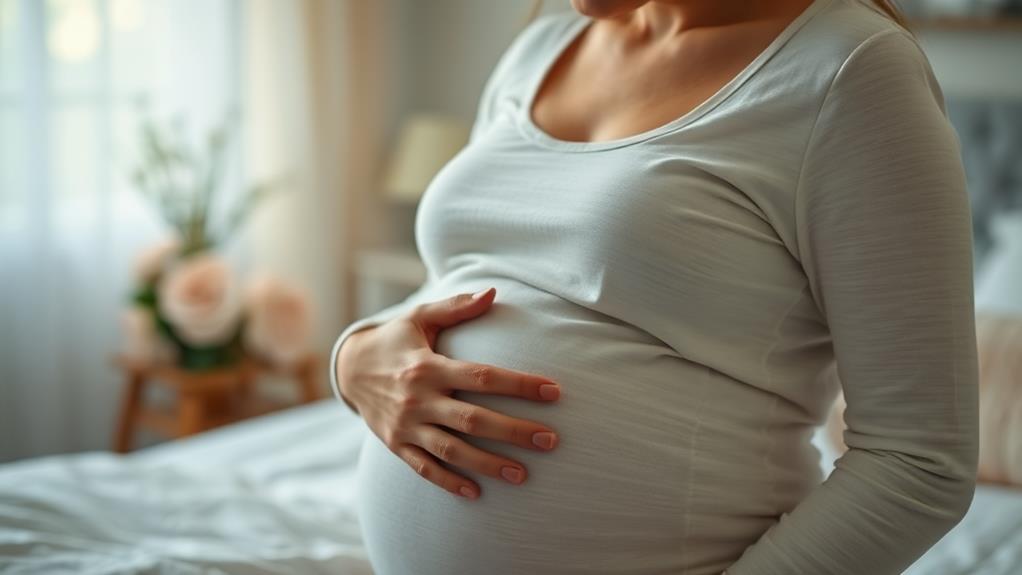Early Pregnancy Uterus Pain: Causes and When to Be Concerned
You might experience some discomfort during early pregnancy, and it's important to understand what's normal and what's not. While mild cramps often stem from your body adjusting to the changes, there are instances when pain could signal a more serious issue. Recognizing the signs can make a significant difference in your well-being and that of your baby. So, how can you differentiate between typical sensations and potential complications? Let's explore the nuances of early pregnancy uterus pain and what you should keep an eye on.
Understanding Early Pregnancy Pain

Most women experience some discomfort as their uterus expands to make room for the growing baby. This can feel like light cramps, similar to those you might get during your period.
It's important to remember that every pregnancy is unique, so what's normal for one person might feel different for another.
You may also notice changes in your body, like bloating or gas, which can add to the discomfort. These are common and can be annoying, but they're usually nothing to worry about.
Of course, if you notice anything intense or unusual, don't hesitate to reach out to your healthcare provider. They're there to help you navigate this thrilling yet sometimes bumpy ride.
Common Causes of Uterus Pain
Uterus pain during early pregnancy can stem from various causes, and understanding them can help ease your mind. One common reason you might feel discomfort is implantation. When the fertilized egg burrows into your uterus, it can cause some cramping and minor pain.
Another reason could be the stretching of ligaments as your body prepares to support a growing baby. This stretching can feel like a tugging sensation, and it's pretty normal.
You might also experience pain from gas or bloating, which can be a pesky side effect of hormonal changes.
Sometimes, you may notice pain related to your ovaries, especially if you've recently ovulated or if you have a cyst. Although these pains are usually harmless, it's always good to stay aware.
Lastly, if you've had previous conditions like endometriosis, that could also make your uterus feel a bit cranky.
While most causes are harmless, don't hesitate to reach out to your healthcare provider if the pain feels severe or unusual. After all, it's better to be safe than sorry when it comes to your health and your baby's!
Normal Sensations in Early Pregnancy

You could also notice increased sensitivity in your breasts. They might feel sore, heavy, or even a bit tingly. It's all part of those hormonal changes; your body's prepping for future breastfeeding.
Plus, you might experience a little bloating or gas, making you feel like you ate an entire pizza all by yourself. Trust me, you're not alone in this!
Another common sensation is mild cramping, which can feel a bit like your period. While it can be a little annoying, it's usually nothing to worry about.
As your body adjusts, these sensations can come and go. Just remember, every pregnancy is unique, and it's perfectly normal to feel a mix of excitement and confusion as you navigate this incredible journey!
Signs of Potential Complications
While some discomfort is normal in early pregnancy, certain signs can indicate potential complications that shouldn't be ignored. If you experience severe pain that feels like it's taking over your whole belly, that's a red flag. You might also want to pay attention if you notice heavy bleeding, especially if it's accompanied by clots. This isn't your average spotting, so take it seriously.
Another sign to look out for is sharp pain that only happens on one side. This could mean something's not quite right. And if you start feeling lightheaded or dizzy, it could be your body's way of saying, "Hey, something's off!"
You should also be cautious if you notice a sudden increase in pain or if it doesn't let up over time. Pregnancy is a wild ride, and while some bumps are expected, you deserve to feel safe and comfortable.
If you're ever in doubt, trust your instincts. After all, you know your body best! So, keep an eye out for these signs, and remember, it's always better to be safe than sorry.
When to Seek Medical Attention

Recognizing the right moments to seek medical attention can make all the difference in early pregnancy. If you're experiencing sharp, intense pain, that might be your body sending up a flare. It's not just cramping; it could be something that needs a doctor's eye.
Also, if you notice any unusual bleeding, especially if it's heavy or accompanied by dizziness or fainting, don't hesitate to reach out for help. Your health and your baby's health are top priorities.
You should also contact your healthcare provider if your pain lasts for more than a few hours or gets worse instead of better. It's like your body's way of saying, "Hey, something's up!"
If you develop a fever or feel sick, that's another sign you shouldn't ignore. Remember, it's always better to be safe than sorry, so don't feel shy about calling your doctor. They're there to help you, after all.
Early pregnancy can be a rollercoaster, and it's totally normal to have questions or concerns. So, trust your instincts! If something feels off, reach out. Your peace of mind is worth it.
Differences Between Cramping and Pain
Understanding the differences between cramping and pain can greatly ease worries during early pregnancy. Cramping often feels like a tightness or pulling sensation in your lower abdomen. It's usually mild and might remind you of menstrual cramps. You might even feel it on and off as your body adjusts to the changes happening inside you. Don't worry; this is often normal!
On the other hand, pain can be sharper and more intense. It might come suddenly and feel more serious, like a stabbing or burning sensation. If you're experiencing pain that doesn't let up, or if it's accompanied by heavy bleeding, it's a good idea to reach out to your doctor.
It's all about listening to your body. If something feels off, trust your instincts!
Remember, every pregnancy is unique, and what's normal for one person mightn't be for another. So, while cramping is usually nothing to fret about, intense pain should definitely raise a flag.
Always keep your healthcare provider in the loop about what you're feeling. After all, it's better to be safe than sorry!
Impact of Lifestyle on Uterus Pain

Your daily lifestyle can considerably affect how you experience uterus pain during early pregnancy. What you eat, how much you move, and even your stress levels can play a big role.
If you're munching on junk food and skipping exercise, your body might feel more uncomfortable. Eating a balanced diet full of fruits, veggies, and whole grains can help keep things running smoothly. Plus, staying active with gentle activities like walking or yoga can ease tension and boost your mood.
Now, let's talk about stress. If you're juggling a million things at once, your body might send you signals, like increased pain. Finding ways to relax, whether it's through meditation, deep breathing, or that favorite TV show, can really help.
Don't forget about hydration! Drinking enough water helps your body function better and can keep those cramps at bay.
In short, paying attention to your lifestyle choices can make a difference in how you feel during this exciting time.
Managing Discomfort in Early Pregnancy
Managing discomfort in early pregnancy often involves a few practical strategies that can make a significant difference.
First, listen to your body. If you're feeling achy, try to rest. A cozy blanket and your favorite show can do wonders!
Staying hydrated is also key. Water helps keep everything running smoothly, and it might ease some of that discomfort too.
Gentle exercise, like walking or stretching, can be beneficial. It boosts your mood and helps with circulation. Just be sure to listen to your body, and don't overdo it—this isn't the time for marathons!
You might also want to try heat. A warm compress on your lower abdomen could provide relief, but avoid hot baths that are too hot, as they can be risky during pregnancy.














Post Comment